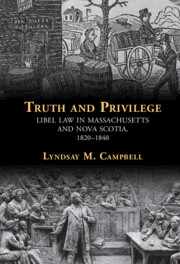Book contents
- Truth and Privilege
- Studies in Legal History
- Truth and Privilege
- Copyright page
- Contents
- Tables
- Foreword – The Osgoode Society for Canadian Legal History
- Acknowledgments
- 1 Introduction
- 2 The Common Law’s Diverging Paths
- 3 The Transformation of Privilege
- 4 Truth, Privacy and Authority
- 5 The Individual Conscience and Blasphemous and Obscene Expression
- 6 Private Defamation Suits
- 7 Conclusion
- Book part
- Bibliography
- Index
- Publications of the Osgoode Society for Canadian Legal History
6 - Private Defamation Suits
Courts in Everyday Life
Published online by Cambridge University Press: 16 December 2021
- Truth and Privilege
- Studies in Legal History
- Truth and Privilege
- Copyright page
- Contents
- Tables
- Foreword – The Osgoode Society for Canadian Legal History
- Acknowledgments
- 1 Introduction
- 2 The Common Law’s Diverging Paths
- 3 The Transformation of Privilege
- 4 Truth, Privacy and Authority
- 5 The Individual Conscience and Blasphemous and Obscene Expression
- 6 Private Defamation Suits
- 7 Conclusion
- Book part
- Bibliography
- Index
- Publications of the Osgoode Society for Canadian Legal History
Summary
Chapter 6 examines civil disputes, most of them unreported, in which individuals – white and generally of middling status – took each other to court over reputational claims. These cases demonstrate the centrality of courts as fora for disputes in Massachusetts, specifically in the Boston and Worcester areas, whereas Nova Scotia saw substantial regional variation, associated with religion, language, indigeneity and lawyer availability, from Pictou to Yarmouth to Halifax. Nova Scotia had far fewer defamation cases both absolutely and relative to population. Massachusetts courts more frequently awarded windfalls, and the costs to a plaintiff of bringing a suit and then dropping it were higher in Nova Scotia. As well, in Massachusetts the writ of attachment was undoubtedly attractive to plaintiffs who wanted to make life difficult for a defendant before trial. This writ was not available for such purposes in Nova Scotia. Women in Massachusetts, far more than in Nova Scotia, turned to courts for redress, and courts were receptive to their claims, especially to those of self-supporting single women.
- Type
- Chapter
- Information
- Truth and PrivilegeLibel Law in Massachusetts and Nova Scotia, 1820-1840, pp. 314 - 377Publisher: Cambridge University PressPrint publication year: 2021

